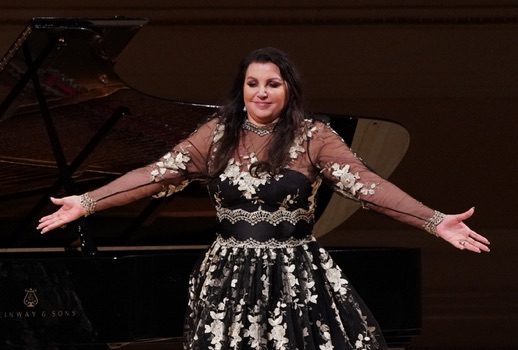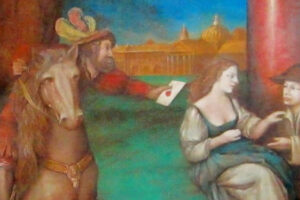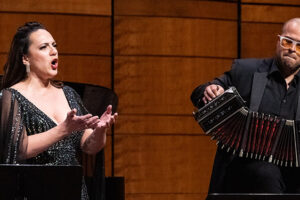

Cape fearsome
It may be true that opera singers aren’t always at their comfiest in the lonely context of the cabaret space. But last week, a pair of terrific recitals demonstrated what kind of intimate spell a dramatic singer can cast when left alone with a piano.
On December 10, soprano Marjorie Owens and baritone Quinn Kelsey graced the Morgan Library’s Gilder Lehman Hall for a joint concert presented by The George London Foundation for Singers (the second in its recital series). The following Tuesday, Maria Guleghina marked the 30th anniversary of her La Scala debut with a marathon performance of concert and opera arias at Carnegie Hall.
The two events featured performers arguably at opposite ends of their respective careers—Owens and Kelsey find themselves on the cusp of operatic stardom; Guleghina’s recital was more of a career retrospective—and yet both showcased the singers’ theatrical charisma.
At the Morgan, Owens and Kelsey traded in both art song and aria. Standing regally in a glittery empire-waisted dress next to pianist Myra Huang, Owens cut a striking figure onstage, and sang ably through three of Tchaikovsky’s most famous melodies. Kelsey followed her set up with selections from Copland’s Old American Songs, using his expressive face, woodsy voice, and black cowboy boots to squeeze every last drop of homespun Americanness out of “The Boatman’s Dance,” “The Dodger,” “Simple Gifts,” and “Long Time Ago.”
For the second half of the recital, each performer sampled some opera—Kelsey singing Yeletsky’s aria from Spades and Owens giving her best “Es gibt win Reich.” The two halves of the recital each ended with a fine take on a different dramatic operatic duet: “Cielo! Mio Padre!” from Aida and “Wie aus der Ferne” from Dutchman, respectively, the latter sung by Kelsey from behind a music stand.
The two performers, once married in real life and apparently still friends, make an attractive couple onstage; on Sunday they complemented each other exceedingly well.
Where her resonance rests on a tight and sometimes warbly vibrato, Owens remains an actress who knows how to shape a vocal line.
Kelsey’s voice, meanwhile, is a marvel, with a sonorous upper range that brought lightness and a honeyed sweetness to the American songs. I was particularly moved by his take on “Simple Gifts,” an air whose second verse about how turning will be our delight “when true simplicity is gained” is so beautiful and so cryptic that I’ll never be sure I quite know what it means, except that I feel wrecked when I hear it.
All I know is that for the song to succeed, a singer must give it delicacy and arm it with a sense of some great, magisterial ritual: such a tall order, and Kelsey turned in the performance of a lifetime.
Clearly this was a concert of standards and there were no big surprises in their choice of rep. But one highlight was hearing two opera singers give side-by-side readings of romantic Tchaikovsky and romantic Copland. Surikov’s folksy “Was I not a blade of grass?” provides a portrait of a despondent girl married to a man she doesn’t love; Copland’s “Long Time Ago” shows how grief-stricken a man can be when his partner passes on.
These two perspectives provide ample room for singers to “act out” their different kinds of sadness. How fortunate that Owens and Kelsey, both accomplished thespians, knew how to shade these pieces properly for their spectators, many of whom had chosen to forgo the Richard Tucker Gala for an afternoon of folksongs.
Just a few days later, to a boisterous crowd of adoring fans at Carnegie Hall, Slavic sensation Maria Guleghina was giving a piano-backed concert of her own.
She could hardly make it through a song set without peals of applause, and had to shush the audience more than once. Which of course posed the question: who, exactly, are these fans who won’t shut up?
To be a fan of Maria Guleghina, one must recognize her for who she is—a fiery Verdian soprano of the ribald Russian sort, the kind of aging chanteuse who won’t stop singing unless you command it. Just try not to marvel at the Armenian’s achievements, as summarized in one of the most repetitive program bios you’ll ever encounter in a Playbill handout: debut at Minsk in 1986; headlining just a short year later alongside Pavarotti and Gavazzeni for a La Scala production of Ballo.
By the ’90s she was a career specialist of the dramatic Italian rep, starring in basically all things Puccini and Verdi—great Turandot, better Tosca, really fun Lady MacBeth—although she kept her profile high throughout the 2000s by performing at the Vancouver Olympics, the St. Petersburg G8 summit, and the Sochi Paralympic Games.
Thirty years after her early triumphs with Domingo and Pavarotti, this Carnegie outing was plainly to be a museum concert, a review of past glories, and an intimate way to celebrate her career. It started with a selection of bel canto songs by Donizetti, Bellini, and Rossini and ended with a pack of operatic showstoppers.
Appearing in an A-line black and silver cape dress (why all the capes lately I wonder?) with long hair worn vampishly down her shoulders, and aided by stalwart pianist Craig Rutenberg, Guleghina proved that she’d lost little of her past brilliance.
Despite some shaky runs and wobbles here and there, occasional Bellini singing under the pitch, and obvious signs of fatigue near the program’s end, her celebrated tone remains intact, and is what makes the artist. Hers is a throaty soprano à la Russe, but it’s also expansive, capable of unleashing generous and exciting torrents of plush sound, especially in the upper register.
Her Donizetti set included songs like “Il Barcaiolo” and “Me voglio fa’ ’na casa” and featured some gorgeous legato in “Amore e morte.” In Bellini works like “L’abbandono,” Guleghina’s voice brought heaps of expressive drama. Her versatility on full display in the light Rossini canzonettas from the cycle La regatta veneziana, she presented “demure,” altering both timbre and body language to show shades of flirtation, lyricism, and pathos.
In every sense, the instrument remains tailor made for evening-length opera. And though she teased us with arias from Gioconda, La Wally, and Andrea Chenier before intermission, the recital’s second half was where she gave the audience what it had come for, set piece after set piece from the shows that made her famous.
Starting with the Letter Scene from Onegin and Lisa’s final aria from Queen of Spades, she ended her set with three massive Verdi arias, from Forza, Ballo, and a striking “Nel di della vittoria” from Macbeth, respectively. Three encores—two from Puccini operas, one a cappella—closed out the evening, with the voice showing audible fatigue only near the very end.
Needless to say, a recital such as this one would have been a larynx-breaker for any singer, and even for Guleghina, it seemed a tad overambitious. Halfway through the second half (before the Verdi), Rutenberg informed the audience that the programmed selections by Babadjanyan and Shchedrin would be skipped due to jet lag.
But the audience cared little for these details; ultimately, it was the memory of her life’s work that mattered. Guleghina was showered with flowers throughout the affair, receiving bouquets even before intermission, and honored with standing ovations that seemed unending. Viva la diva!
Photo: Richard Termine























Comments